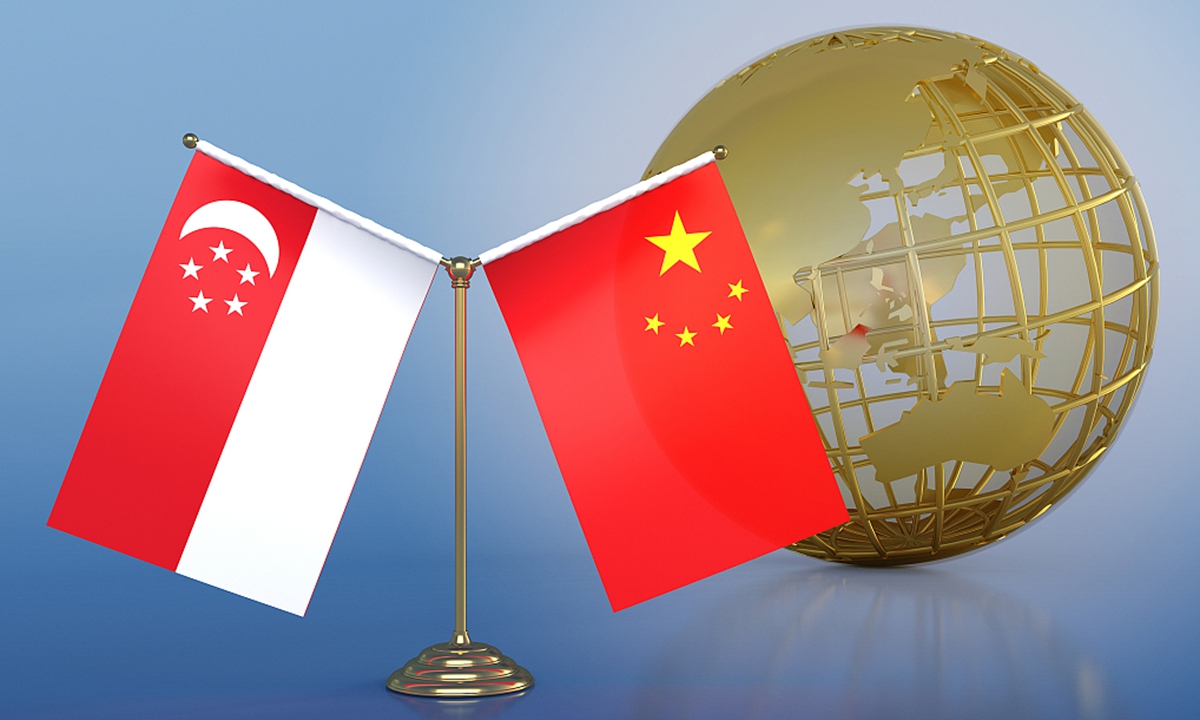Singapore companies in China look forward to continue operating and investing in China, despite global challenges: business group

China Singapore Photo:VCG
A Singapore business representative group in China is optimistic that the country will rebound strongly after the pandemic despite the challenging global geopolitical environment, with 98 percent of the surveyed Singaporean companies in China looking forward to continue operating and investing in China.
A survey conducted by the Singapore Chamber of Commerce and Industry in China (SingCham) is a reflection of the strong positive outlook of the Chinese economy and the market, as well as vast opportunities for cooperation.
Speaking with the Global Times in an exclusive written interview over the weekend, Ong Tze Guan, chairman of the SingCham, said that the Singaporean business group is optimistic that China will rebound strongly in the post-COVID era.
This is because the Chinese government prioritizes economic recovery by supporting businesses through increased infrastructure investment, incentive policies and initiatives to boost domestic consumption, Guan said.
With China's downgraded epidemic response, the resumption of international travel, and the government's efforts in boosting trade and investment, foreign companies - including the members of the Singaporean business group - have a very positive outlook on the Chinese market's recovery.
In a survey conducted by SingCham that asked if its member companies would continue investing and operating in China after understanding its priorities and policies, 98 percent of the respondents said they were looking forward to continue operating and investing in China.
"It shows that our members are still very confident of the Chinese government and optimistic about the potential of the Chinese market," the chairman said, noting that there are many areas of potential cooperation between Singapore and China, including digital innovation, smart cities, sustainability, fintech and healthcare.
Guan's remark came amid Singapore's Prime Minister Lee Hsien Loong's visit to China from March 27 to April 1, during which both sides made substantive and fruitful exchanges and signed new agreements, including a memorandum of understanding to announce the substantive conclusion of subsequent negotiations on an upgraded bilateral free trade agreement, the Xinhua News Agency reported on Saturday.
Lee concluded on his Twitter account that "this visit has set a refreshed, positive and forward-looking trajectory for our bilateral relations."
The significance of his visit to bilateral economic ties was shared by the Singapore business group. "Singapore is keen to continually enhance its economic ties with China through upgrading its bilateral relations with both countries committed to broaden and deepen bilateral cooperation, especially in the areas of digital and green economies," Guan said.
One key area in which the business group sees great potential for further cooperation is the joint construction of the China-proposed Belt and Road Initiative (BRI).
Singapore has been an active participant in the BRI over the years, exemplified by the investment for China-Singapore Chongqing Connectivity Initiative, which opens an avenue for both intergovernmental cooperation and private business ventures between the two sides.
Moreover, Singapore has a unique position as one of Asia's financial hubs. In 2021, for example, 35 percent of outbound BRI investments and 85 percent of inbound flows from BRI countries to China came through Singapore, according to the SingCham.
"The chamber sees the BRI continuing to offer Singapore companies in the logistics, transportation, financial services, professional services, information and communications sectors unique opportunities to provide knowhow, services and collaboration on infrastructure development," Guan said.
Closer cooperation between Singapore and China's Hong Kong Special Administrative Region (HKSAR) is also expected among business groups, with both sides being major financial centers in Asia, and having strong financial infrastructure, regulatory frameworks and talent pools.
While some foreign media claim that Singapore is engaged in a battle of Asian hubs against the HKSAR, what Guan sees is more of a cooperation not competition.
Both could work together to promote regional financial integration, such as through the development of common standards and frameworks for financial regulation and supervision. Other cooperation sectors include the joint development of new financial technologies, according to Guan.
"They could enhance their own competitiveness, bridge the gap between China and the rest of the world, and contribute to the development of a more integrated and vibrant financial ecosystem in Asia," Guan said.

